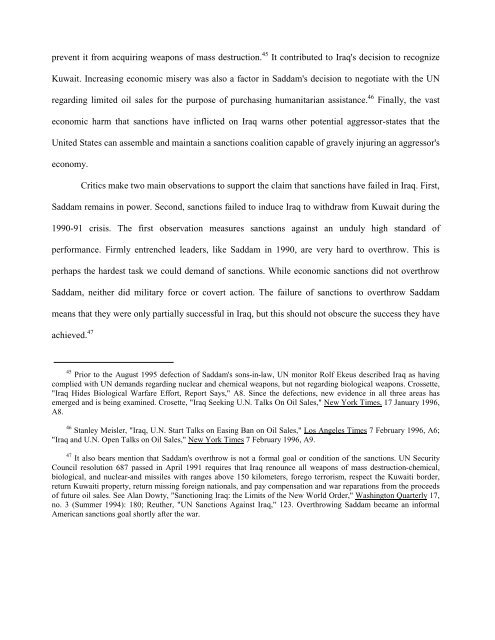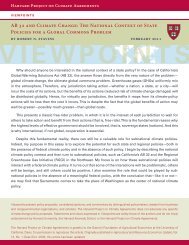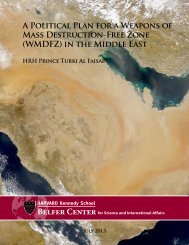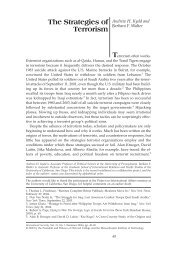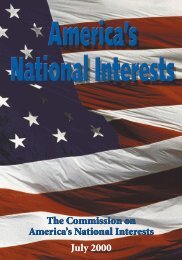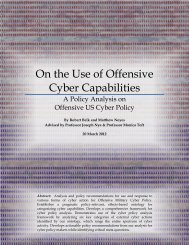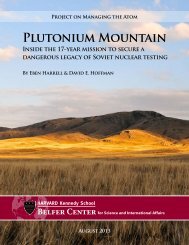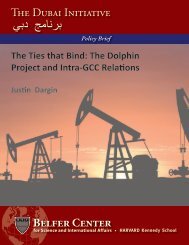Using Economic Sanctions to Prevent Deadly Conflict Elizabeth S ...
Using Economic Sanctions to Prevent Deadly Conflict Elizabeth S ...
Using Economic Sanctions to Prevent Deadly Conflict Elizabeth S ...
Create successful ePaper yourself
Turn your PDF publications into a flip-book with our unique Google optimized e-Paper software.
prevent it from acquiring weapons of mass destruction. 45 It contributed <strong>to</strong> Iraq's decision <strong>to</strong> recognizeKuwait. Increasing economic misery was also a fac<strong>to</strong>r in Saddam's decision <strong>to</strong> negotiate with the UNregarding limited oil sales for the purpose of purchasing humanitarian assistance. 46 Finally, the vasteconomic harm that sanctions have inflicted on Iraq warns other potential aggressor-states that theUnited States can assemble and maintain a sanctions coalition capable of gravely injuring an aggressor'seconomy.Critics make two main observations <strong>to</strong> support the claim that sanctions have failed in Iraq. First,Saddam remains in power. Second, sanctions failed <strong>to</strong> induce Iraq <strong>to</strong> withdraw from Kuwait during the1990-91 crisis. The first observation measures sanctions against an unduly high standard ofperformance. Firmly entrenched leaders, like Saddam in 1990, are very hard <strong>to</strong> overthrow. This isperhaps the hardest task we could demand of sanctions. While economic sanctions did not overthrowSaddam, neither did military force or covert action. The failure of sanctions <strong>to</strong> overthrow Saddammeans that they were only partially successful in Iraq, but this should not obscure the success they haveachieved. 4745 Prior <strong>to</strong> the August 1995 defection of Saddam's sons-in-law, UN moni<strong>to</strong>r Rolf Ekeus described Iraq as havingcomplied with UN demands regarding nuclear and chemical weapons, but not regarding biological weapons. Crossette,"Iraq Hides Biological Warfare Effort, Report Says," A8. Since the defections, new evidence in all three areas hasemerged and is being examined. Crosette, "Iraq Seeking U.N. Talks On Oil Sales," New York Times, 17 January 1996,A8.46 Stanley Meisler, "Iraq, U.N. Start Talks on Easing Ban on Oil Sales," Los Angeles Times 7 February 1996, A6;"Iraq and U.N. Open Talks on Oil Sales," New York Times 7 February 1996, A9.47 It also bears mention that Saddam's overthrow is not a formal goal or condition of the sanctions. UN SecurityCouncil resolution 687 passed in April 1991 requires that Iraq renounce all weapons of mass destruction-chemical,biological, and nuclear-and missiles with ranges above 150 kilometers, forego terrorism, respect the Kuwaiti border,return Kuwaiti property, return missing foreign nationals, and pay compensation and war reparations from the proceedsof future oil sales. See Alan Dowty, "Sanctioning Iraq: the Limits of the New World Order," Washing<strong>to</strong>n Quarterly 17,no. 3 (Summer 1994): 180; Reuther, "UN <strong>Sanctions</strong> Against Iraq," 123. Overthrowing Saddam became an informalAmerican sanctions goal shortly after the war.


